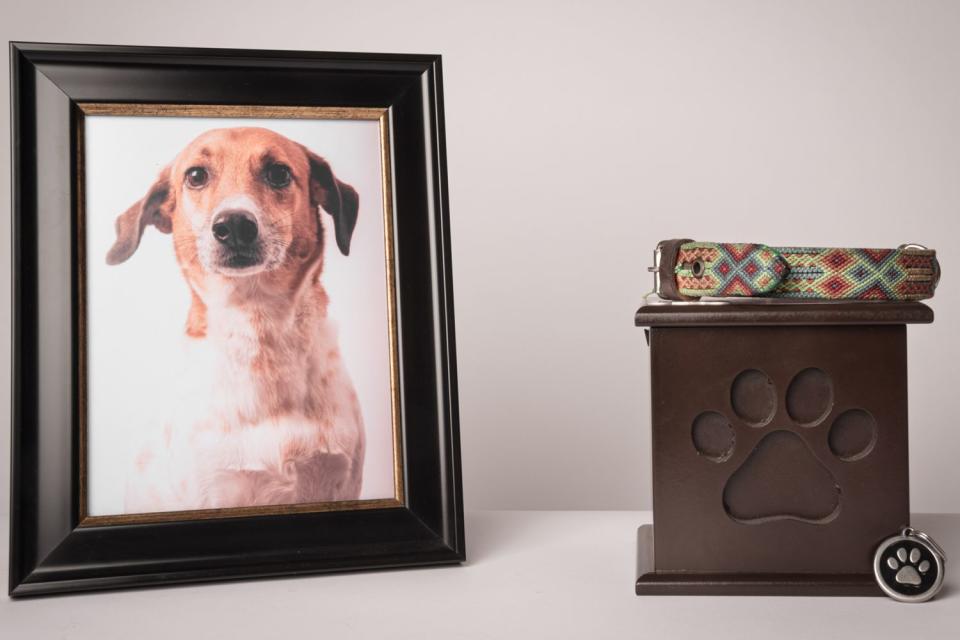Paranormal Experiences with Ghosts of Dogs Could Help Pet Owners Deal with Their Grief, New Study Suggests
- Oops!Something went wrong.Please try again later.
"There is something different going on in the grieving process for dog guardians that makes supernatural encounters operate differently than they do in more typical human mourning," wrote study author Jennifer Golbeck

Getty
A stock image of a dog memorialParanormal encounters with deceased pets may help some animal owners cope with their grief, according to a new study.
Jennifer Golbeck, a computer science professor at the University of Maryland, recently conducted the first systematic study of the supernatural experiences of bereaved animal owners. The goal was to examine the range of perceived encounters with deceased canine companions and their meaning and significance to the pet owners.
Golbeck conducted the study using social media, posting a prompt on both X (formerly known as Twitter) and Instagram that asked, “If you have lost a dog, have you had an experience like seeing their ghost, receiving a sign, did they communicate with you?”
Related: 'Grief is Grief': Why the Death of a Pet Can Feel Worse than Losing a Human Loved One
She received 544 candid responses and organized them according to two major themes with six subthemes: "Physical experiences (hearing, seeing and touching the ghost of a dog) and interpreted experiences (seeing signs in nature, receiving visits from the deceased dog in dreams, and attributing feelings and phenomena to the spirit of the dog)."
The most common sensory experience (37% of responses) involved hearing the dog, such as a bark or the sound of claws clicking on the floor. Nearly half (44.4%) of the physical experiences occurred at night, with people reporting in 45 of the cases that they've felt their dog lying in bed next to them.
The most commonly cited interpreted experiences included visitations in dreams (15%) and ghostly activity (also 15%) such as objects moving or a living pet acting a certain way in the spirit of a deceased pet.
Golbeck looked at how respondents described their feelings associated with their supernatural experiences, and found that the majority of people (74.6%) reported feelings that were positive, bringing a sense of comfort, reassurance and protection or even a gift. The finding was noteworthy, she wrote in the study, because "psychology largely characterizes externalized continuing bonds — particularly seeing ghosts — as negative and even maladaptive."
Overwhelmingly, respondents considered their supernatural experiences as comforting rather than distressing.
"This suggests there is something different going on in the grieving process for dog guardians that makes supernatural encounters operate differently than they do in more typical human mourning," Golbeck wrote.
Related: What World Leaders, Famous Figures, and Stars Have Said About Loving and Losing Their Pets
The author suggested that the grief that people feel for their lost pets may differ in a unique way from the grief they experience over the death of a human loved one. "Namely, that it is often disenfranchised," she wrote.
"Because there are few socially accepted rituals around companion animal deaths, no accepted mourning period, and dog guardians’ grief is often minimized or even mocked, this leads to an experience of disenfranchised grief, where the mourner is socially denied the grieving process," Golbeck continued.
She also noted that psychological research typically refers to supernatural experiences with terminology such as "hallucinations" or "mistaken interpretations," which can feel "invalidating" for people grieving their deceased pets.
Never miss a story — sign up for PEOPLE's free daily newsletter to stay up-to-date on the best of what PEOPLE has to offer, from celebrity news to compelling human interest stories.
"Indeed, there were many comments in the present study where people preemptively defended against an anticipated attack about whether their experiences were 'real.' While a hallucination or illusion may scientifically explain why someone sees the ghost of their lost dog, it does not explain the subjective experience," she wrote.
The subjective experience, Golbeck said, is critical to the meaning that people derive from supernatural encounters. She also noted that there is likely a rational reason for people to believe in supernatural interactions with their deceased pets due to their experience of disenfranchised grief.
"A seemingly magical visit by the ghost of a beloved lost dog offers a feeling of the mystical, the special and a signifier of the importance of the relationship," she wrote. "Such experiences would reasonably be seen as validating and comforting in the face of the invalidation of disenfranchised grief."
For more People news, make sure to sign up for our newsletter!
Read the original article on People.

